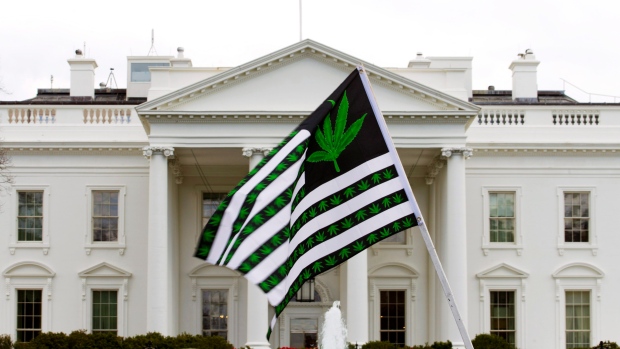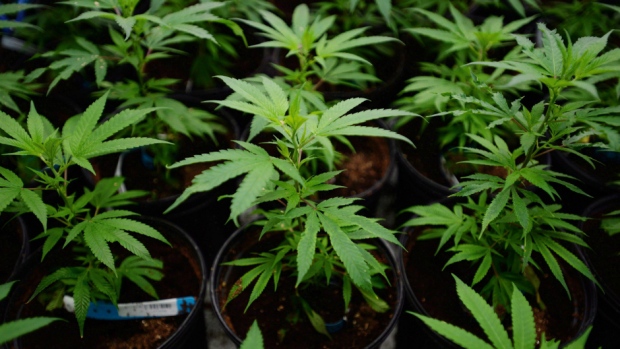Dec 10, 2017
U.S. marijuana companies running into expansion problems with Uncle Sam
, Bloomberg News

Cannabis companies hoping to become the McDonald’s of legal weed through franchising are running into a big problem: Uncle Sam.
Eight states and the District of Columbia have voted to legalize marijuana for recreational use, and 28 more have approved it for medicinal purposes. But pot is still illegal under federal law and -- unfortunately for pot businesses -- a product that crosses state lines falls under U.S. jurisdiction.
That means weed companies seeking to expand beyond their native states have to be more creative than a typical consumer packaged-goods seller. To cope, entrepreneurs are mostly using licensing and franchising agreements. A company might provide edibles recipes or branding expertise, for example, without ever shipping pot across state lines.
“We’re trying to find the best way to do it to comply with federal regulations on an industry that’s federally illegal,” said Christian Hageseth, a pot business veteran and chief executive officer of One Cannabis in Denver, which is franchising pot shops. “It’s a tricky scenario.”
The main driver behind out-of-state expansion is a desire by pot retailers to get into more markets as the industry becomes mainstream. The legal cannabis business, estimated at $6 billion last year, is expected to hit US$50 billion by 2026, according to Cowen & Co. It may be growing even faster than excepted. An Arcview Market Research report released Wednesday said sales will reach $9.7 billion this year.
Some weed entrepreneurs say the real risk is moving too slowly.
“It’s kind of the old adage ‘grow or die’ to some respect,” said Chuck Smith, chief operating officer and co-founder of Dixie Brands Inc., a Colorado-based edibles company based in Denver. “We didn’t build this company to just service one market.”
Dixie has expanded into California, Nevada and Maryland by using a licensing model. Dixie Brands itself doesn’t actually touch the cannabis plant. Instead, it partners with licensed pot businesses in each state to make Dixie-branded products.
Don’t Wait
With marijuana foe Jeff Sessions running the U.S. Justice Department, the odds of weed becoming legal under federal law any time soon are slim. But many entrepreneurs say businesses who wait for that day are asking for trouble. While the big tobacco, alcohol and pharmaceutical companies have largely steered clear of the industry for now, that would probably change with federal legalization.
“Brands who are not thinking beyond their own state may find themselves really in a tough competitive situation against large national brands that are going to enter,” said Nancy Whiteman, co-owner of Wana Brands, a Boulder, Colorado-based edibles company.
Wana is licensing its intellectual property to partners in different states. The brand has expanded into Nevada and Oregon and will launch in Arizona in December. In 2018, Wana will enter Illinois, Florida, Maryland, Pennsylvania, Ohio and Michigan and is in talks with partners in California and Canada, Whiteman said.

Different Rules
The complexity of out-of-state expansion goes beyond finding licensed partners that have supply chains. Each location also has its own regulatory regime, meaning brands have to cater to a whole new set of rules for packaging, advertising, and, in some cases, the products themselves. That’s on top of banking regulations and tax burdens shouldered by the licensing company’s plant-touching partners.
“It’s still our same basic products, but the flavors can be different, the dosages can be different, the packaging may be different, the labeling certainly is different,” Whiteman said.
When Wana Brands launched in Oregon, for example, it had to reduce the amount of THC -- the chemical compound that induces a high -- per serving compared with its products in Colorado. In Nevada, the company had to redesign its already-created packaging when a new regulation said companies couldn’t have images on packs. Wana’s had pictures of fruit.
No Mints
Dixie Brands has faced similar hurdles. Maryland’s regulatory body said it didn’t like the term “mints” because it was too similar to candy, Smith said. The company had to change the description to “tablets” and was forced to make the packaging more plain.
“It becomes difficult to scale,” Smith said.
Some companies have decided that it just isn’t worth it to go out of state. That’s especially true for those based in California, where recreational pot begins in some markets on Jan. 1.
For Gunner Winston, CEO of Hmbldt, a Los Angeles-based vapor-pen company, there’s much to do at home before looking toward other states, though it is preparing to enter Canada.
“It takes too much work to be great in a place this early in a company’s lifespan to spend time in other places that I don’t think are as relevant to our future yet,” he said.
Still, some entrepreneurs say the high barrier of entry is an opportunity in itself, particularly for veterans of the fledgling industry. That’s why Hageseth, who’s been in the weed business for eight years, decided to expand his chain of dispensaries using a complicated franchising model.
He set up an intellectual-property company that licenses know-how and branding to franchisers in each state. Those businesses then work intrastate with franchisees. One Cannabis has signed deals for three dispensaries in Ohio, two in Michigan, one in California and two more in its home state.
“There’s a perception of brand continuity, but the reality is that each state still has to operate in a silo,” Hageseth said.
By franchising with him, new entrants into the industry can avoid the pitfalls that he encountered.
“When I got into it, we didn’t have this option,” he said. “I wish I could have paid somebody 100 grand and 5 per cent of my revenue not to make all the mistakes I’ve made. I would be millions of dollars ahead.”


